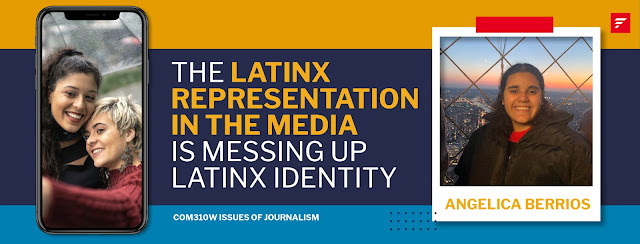The Latinx representation in the media is messing up Latinx identity --- by Angelica Berrios '23

The title may seem alarming but it’s true. Latinx is a gender-neutral term for Latino and Latina and is a term that has been popularized in recent years as a more inclusive term. According to UCLA’s 2020 Hollywood Diversity Report, Latinx people were more than 18% of the population but only had 5.3% of the roles in the Hollywood entertainment industry. In the U.S. alone, the Latinx population is so prominent and is one of the biggest minority groups, so how come the media is not reflecting that? In terms of why the media is not reflecting a big part of its population lies in the issues of these so-called Hollywood “gatekeepers”, which is a term used to describe any person that has the highest power in an industry and can control what is presented, who are predominantly Caucasian and do not understand the history of most minority groups. Most Latinx stories in the media fall into the same stereotyped umbrella and the complex history of Latinx people is mostly swept under the rug. Centuries of colonialism and racial oppression could lead to some interesting stories being told, however, if there is barely any representation on-screen for Latinx characters then there are even less people representing that minority behind the scenes.
Three women from Puerto Rico, Guatemala, and Mexico expressed their opinions and personal experiences regarding this representation issue. All presented different points but reached the common ground that the representation they received from the media gave them a serious identity crisis, even if they did not realize it at the time. My favorite princess was Jasmine. And it was largely because she was brown. And I felt identified with her even though there are no cultural links at all because she comes from a made-up country in the film” says Natalia de Leon, who is a Franklin University Switzerland student currently studying Political Science and Communication and Media Studies, who cited Princess Jasmine from the Disney film Aladdin as a princess she looked up to. Puerto-Rican born and raised Lola Montilla, who is the host of her own podcast Enemiga del Silencio (Enemy of Silence) covering various topics ranging from women empowerment to relationship advice for a majority Puerto Rican audience, cited characters from Broadway musicals like Chicago and America Ferrera in the film The Sisterhood of the Travelling Pants saying that “I do recognize that Latina women were not correctly represented. “Even during the times of like America Ferrera films, like The Sisterhood of the Traveling Pants. And all of these movies that represented big Latin families, like the ones that I had, we are loud, and women that are curvy, and I was always really curvy, and really chubby when I was growing up. So being able to see films that would represent me. It was amazing. It was amazing to be able to feel represented in films, but it wasn't the majority of the time”. Finally, Mexican-born Sofia Rojo-Kratochvil, who is a blonde and tall girl that does not fit the conventional “Latina” look, cites Disney princesses as well saying “I know Snow White, I didn't see myself in it but if you talk about Sleeping Beauty, I could definitely see her and see myself in a princess because I do have similar characteristics as her”.
These three Latinx women, hailing from different countries, all noticed how the media aids in creating identity crises at a young age. “I'd say growing up, I never truly felt “seen”, says de Leon. “In the media whatsoever, I'd see a brown person and I would immediately resonate with them. And I'm looking in retrospect, it really had an effect on my perception of myself, because I think as a kid, I was kind of going through an identity crisis without even noticing it. She resonated with black characters in the media even though she was not black. These types of situations can go deeper than not being “seen” but can also detriment our identity. However, it can go even deeper than that since what we do see in the media can affect how the rest of society reacts to people of Latinx backgrounds.
Montilla recounts an instance where a man from the United States did not believe that she was American because she was from Puerto Rico even though she had a U.S. passport. An instance like this is common since news outlets scarcely cover life in Puerto Rico and how U.S. affairs can affect us directly in more ways than people think. What can be fixed? How can we avoid these certain situations? Well for starters, there needs to be opportunity - opportunity for the Latinx community to have their voice heard and not be constrained.
Representation matters and this type of representation will keep hurting the identities of generations to come. The progress is happening but it is happening way too slowly and when it does, there are always setbacks. The television show One Day at a Time (2017-2020), which presented the story of a Cuban-American family living in Los Angeles, provided a shimmer of hope for the underrepresented Latinx community with a completely Latinx cast and crew. Alas, the show was canceled in the midst of the COVID-19 pandemic not even halfway through the fourth season leaving the series with no proper ending. The change needs to happen, now the right timing has to be found.
**************
This article is part of an assortment of student-written journalistic pieces from Fall ‘21 semester’s “Issues of Journalism” course with Professor Elettra Fiumi.
Learn more on this exciting project here.



Comments
Post a Comment